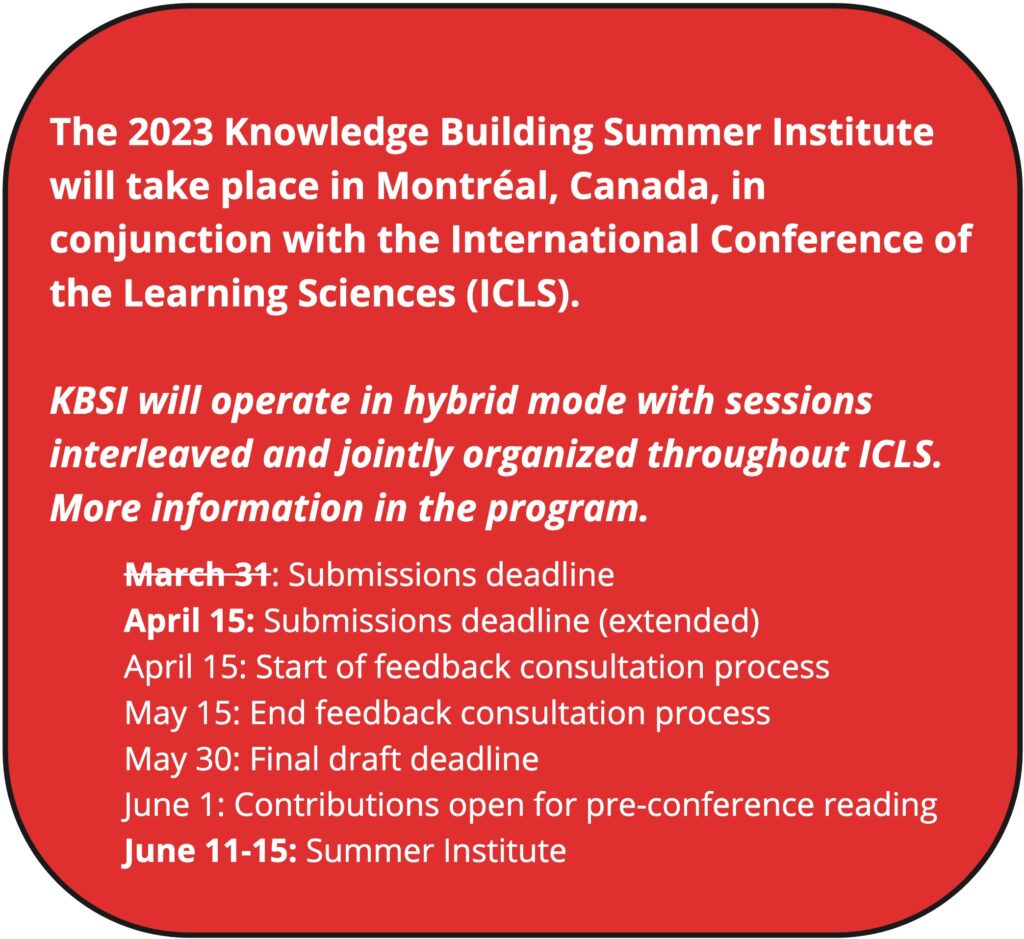Call for proposals
 Knowledge-creating communities spend a great deal of time in design mode—a mode of thought essential for creating new knowledge. New ideas thrive in contexts where there is balance between the predictable and unpredictable–– where what is known is the starting point for idea improvement not the apex—with ideas given a public life as part of a risk-taking enterprise with productive failure-driven corrective feedback. In technical terms, the vibrant space for design-mode work is the edge of chaos—a zone of unpredictability and risk but also of openness to new possibilities. In contrast, education favours predictability and risk avoidance to a fault: It is hierarchical and works backward from predetermined curriculum and assessment goals to determine direct paths to known ideas to be added to one’s personal repertoire.
Knowledge-creating communities spend a great deal of time in design mode—a mode of thought essential for creating new knowledge. New ideas thrive in contexts where there is balance between the predictable and unpredictable–– where what is known is the starting point for idea improvement not the apex—with ideas given a public life as part of a risk-taking enterprise with productive failure-driven corrective feedback. In technical terms, the vibrant space for design-mode work is the edge of chaos—a zone of unpredictability and risk but also of openness to new possibilities. In contrast, education favours predictability and risk avoidance to a fault: It is hierarchical and works backward from predetermined curriculum and assessment goals to determine direct paths to known ideas to be added to one’s personal repertoire.
How can Knowledge Building engage students directly in the means by which knowledge is advanced in knowledge-creating communities when it must operate within infrastructure built for a different purpose? For Knowledge Building to thrive, design mode thinking and discourse must be integral to everyday knowledge work and connected with the work of a worldwide community of knowledge creators addressing complex problems of our modern world. What innovations suggest this is even possible? How can knowledge builders themselves operate more effectively as a knowledge-creating community to address these challenges? These issues are pressing, as barriers to working in design mode show up at all levels of the educational enterprise. For example, the literature on professional development suggests implementation rather than innovation is the priority, a priority reinforced through top-down mandates from policy makers. This situation is reflected in the most frequently expressed concern about Knowledge Building: How is it possible to carry on Knowledge Building while meeting curriculum guidelines and passing mandated tests?
The knowledge building community is generating new models and addressing new challenges, including engaging students in design mode with conversational AI and demonstrating how work in design mode can address curriculum and assessment concerns. The summer institute itself operates in design mode, an extension of monthly Knowledge Building Connects meetings, preliminary to and following from work at our annual meeting.
For the 2023 Knowledge Building Summer Institute we are calling on the community to contribute ideas to Knowledge Forum and to work as a team in design mode to address challenges. Ideas at all stages of development are welcome, from initial designs under construction to more traditional papers, posters, panels, and symposia, as well as videos, demonstrations, and other innovative formats.
As in the past few years, reviewers of submissions will not recommend acceptance or rejection but will provide feedback to authors to improve the submission for discussion at the summer institute and ongoing meetings.
Building on to last years’ sessions, contributors wishing to engage in design iteration dialogues are invited to join in the Knowledge Building Collaboratory—a Knowledge Forum living lab designed to be especially favourable to work in design mode and to incorporate online and offline, synchronous and asynchronous, sustained design and agile events. We hope before, during, and after KBSI2023 you will join us in Knowledge Forum and Knowledge Building Connects meetings to sustain year-round idea improvement to address Knowledge Building challenges.
